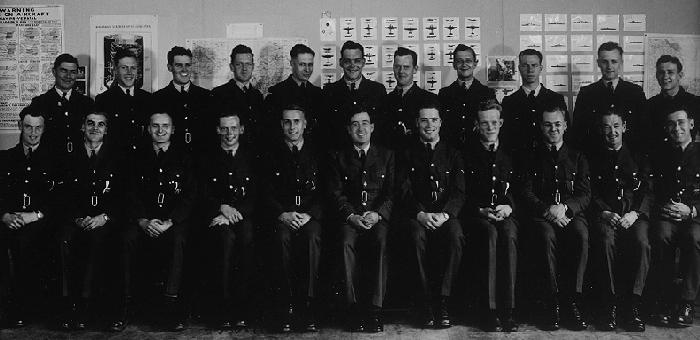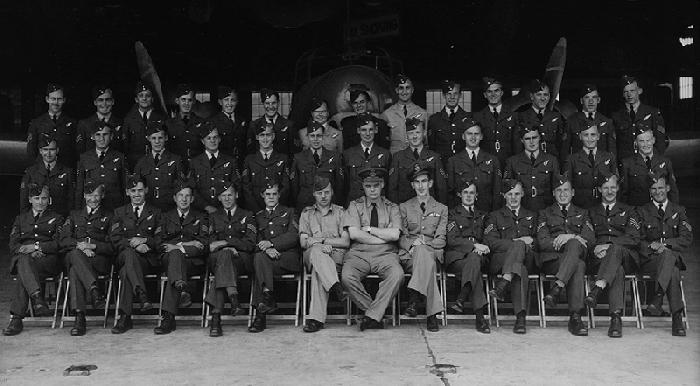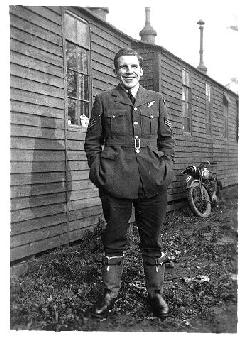|
On arrival in Halifax on 19 November 1940 I was sworn into the RCAF.
My number was R76221. Normally, I would have been posted to the Manning
Depot in Toronto, but because of an epidemic of measles there, I was sent
to the Manning Depot in Brandon, Manitoba. The pay was $1.10 per day. I
left Halifax by train for Brandon on the CNR route, via New Brunswick,
Rivière-du-Loup, and Montreal. I was with a group of recruits who
seemed much older than me and I was somewhat shocked at the beer-drinking
and the general rowdiness which took place. I have no specific recollection
of passing through Quebec City, Montreal, or other places along the way.
At the Manning Depot in Brandon I went through basic training, which
consisted of drills, lectures, and outfitting. Not being familiar with
military ranks, I was at first impressed by the authority seemingly held
by the corporal in charge of the raw recruits like myself. He acted as
if he was the "big boss." We soon got to know what a corporal's
status and functions were. I spent Christmas of 1940 with Peter and Florence
Dibblee in Winnipeg. Florence was from Sluice Point. It was a very enjoyable
break. I don't recall ever being in Winnipeg after that.
Early in 1941 I was posted to Rivers, Manitoba, for guard duty at the
Advanced Navigation School. It was bitterly cold and the job was not very
interesting, marching around the camp boundaries carrying a gun on your
shoulder at all hours of the day and night. How effective I would have
been had I met "the enemy" is questionable.
|
On 4 August 1941 I went back to Rivers, Manitoba, now as a student
at the Advanced Air Navigation School. I learned to navigate by the stars
(astro navigation) and again I flew in Avro Anson airplanes. Although there
are literally millions of stars in the sky, only a very limited number
in each hemisphere can be relied upon for navigational purposes. In order
to establish your position on a navigational map you had to obtain readings
on two stars with a bubble sextant from the airplane's plexiglass astrodome.
(The sextant we used had a bubble as an artificial horizon to obtain the
altitude of the stars, in contrast to a naval sextant which uses the true
horizon.) Then, you plotted these readings on the map and, if your work
had been done accurately, you would obtain your exact position. All this
work involved navigation books, Greenwich time, correct readings, and a
lot of self confidence.
I was fascinated by astro navigation and, with hard work and perseverance,
I managed to pass this course. Graduation Day was on 1 September 1941.
The ceremony was open to the public and largely attended. Among the graduates
was Warren Wortley, originally from Toronto and now living in Comox, British
Columbia. I have always kept in touch with Warren.
My training in Canada was complete and I left Rivers for home, on a
short leave before the next posting, which for myself and the majority
of my colleagues from the course in Rivers was overseas. My two weeks'
leave at home was spent visiting family and friends and bidding everyone
farewell. My brother, Antoine, was to be married on 23 September, but since
I had to report to Halifax a few days before that, I missed the wedding.
|
|
No3 Air Observer's School, Regina, Sask.
Warren Wortey, back row, far right

|
|
Guard duty didn't last long and my next posting was to No. 3 Air Observer
School in Regina, Saskatchewan. This school, along with many others across
Canada, was part of the British Commonwealth Air Training Plan, formed
and operated by Canada and one of this country's major contributions to
the war effort. I was chosen to be an air observer on the assumption that
as a bank employee I was good at mathematics. At the time I was in training,
an air observer was both the navigator and the bomb-aimer of the crew.
Later on, the tasks were divided and performed by two different persons,
a navigator and a bomb-aimer. I found the course very difficult, no doubt
because of my weak educational background. I worked very hard and passed
with 65% (the passing grade was 60%), which was better than some who had
college degrees but failed the exam. I was promoted sergeant air observer
on 23 June 1941. On this course we were flying Avro Ansons, which were
twin-engine airplanes. It was my first experience in an airplane and I
thoroughly enjoyed it. Our pilots were all civilians who, to overcome the
monotony of repeatedly flying the same routes month after month with student
navigators, would occasionally engage in low flying over railway tracks,
etc. They had to be very careful, since they were breaking the rules and
could have been severely reprimanded had they been found out. For the students,
however, it was great fun.
After graduating as an observer I had some time off and with a few
friends went by train to Banff and Lake Louise. I still have snapshots,
taken at that time, of the Great Divide and of some of us riding horseback.
|
On arrival in Halifax five or six of us were told that our names were
being added to the embarkation list for that day and that we would leave
immediately. Hurriedly, we got our inoculations and our baggage was sent
to the ship. Then, we were suddenly taken off the list because somebody
more important than us had priority. We were instructed to go to the ship
and retrieve our baggage, which we did, but getting off the ship was a
major problem. Imagine trying to go down the gangplank carrying your baggage,
on a ship that is about to sail for overseas. Our story was not too plausible,
but eventually an officer came to our rescue and we returned to the depot.
Two days later, on 22 September 1941, my 21st birthday, I sailed for England.
I can't recall the name of the ship. It was small, not overcrowded and
quite comfortable. We joined a convoy and had an uneventful trip.
We landed at Larne, Northern Ireland, took a ferry to Stranraer, Scotland,
and travelled by train to Bournemouth, England. Bournemouth is located
on the English Channel. It was and still is today a resort town with many
hotels, which during the war years were taken over by the Royal Air Force
to billet the airmen from the "colonies," pending postings to
air bases. On the way to Bournemouth the train stopped in the middle of
the night, somewhere in Yorkshire I think, and I could hear the local residents
talking on the station platform. Not being used to their accent I understood
very little and actually questioned whether they were speaking English.
|
|
Advanced Air Navigation School, Rivers, Manitoba,
August, 1941.

|
The next posting was to No. 2 Bombing and Gunnery School
in Mossbank, Saskatchewan. I was there from 23 June to 4 August 1941. The
airplanes we flew there were single-engine Fairy Battles. They were very
noisy and uncomfortable. I really did not enjoy the course, but no doubt
it was all part of the training to become air crew.
Jack Portch, Moreton-in March, England,
November, 1941.

|
At that time the RCAF did not have its own squadrons, so we Canadians
were assigned to the RAF. They treated us as their own and posted us wherever
we were needed. Eventually the RCAF formed its own squadrons, wings, etc.
and was in full command of its airmen. There was even a French Canadian
squadron, L'Alouette Squadron, No. 425, but as fate would have it I remained
with the RAF throughout the war.
Later in the autumn of 1941 I was posted to No. 21 Operational Training
Unit (O.T.U.) in Moreton-in-Marsh, Gloucestershire. This village is in
the Cotswold district, a short distance northwest of Oxford and also near
Banbury (of the nursery rhyme "Banbury Buns"). The airplanes
there were Avro Ansons and Wellington Bombers (2 engines). At this base
crews were formed and we trained for the "real operations." The
term "operations" meant engaging in battle with the enemy and
was commonly referred to as "ops." A tour consisted of so many
"ops."
That year I had Christmas dinner at the Manor House Hotel in Moreton-in-Marsh,
a typical hotel in a small village. I still have in my possession a menu
from this dinner which is signed on the back by Jack Portch, Warren Wortley,
Vern S. Irwin (killed in action in Egypt in October 1942), and by Sandra
and Doris who must have been waitresses, since it was strictly a stag dinner.
Throughout the years I have managed to visit Jack on a regular basis. Unfortunately,
I don't see Warren as often. Destiny has us living far from one another.
|

